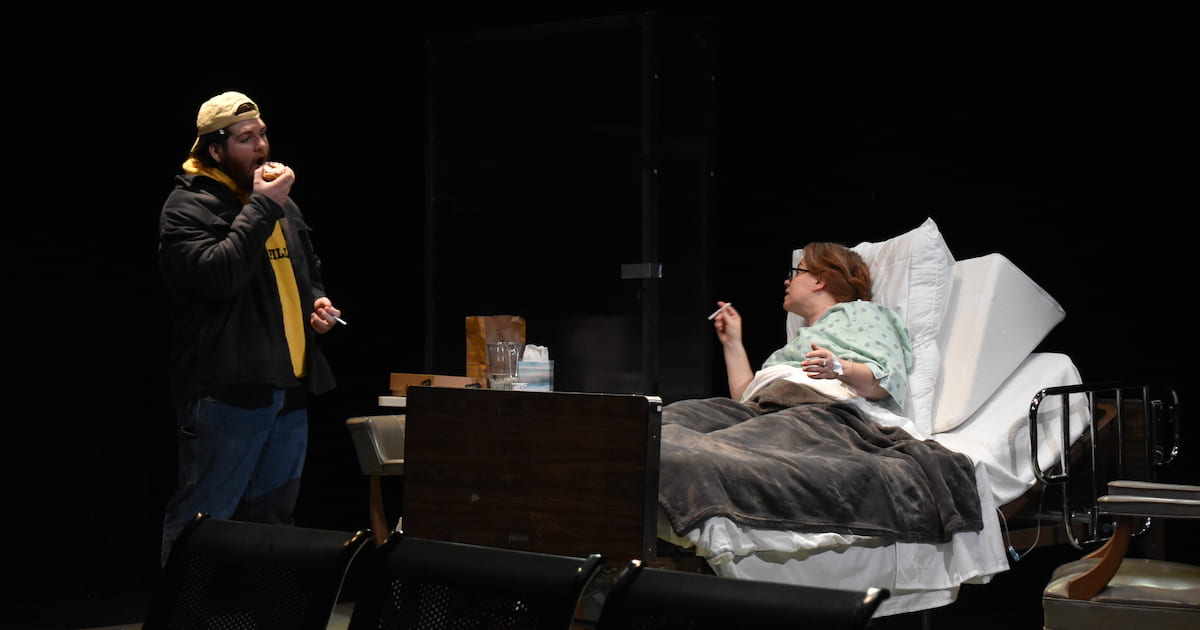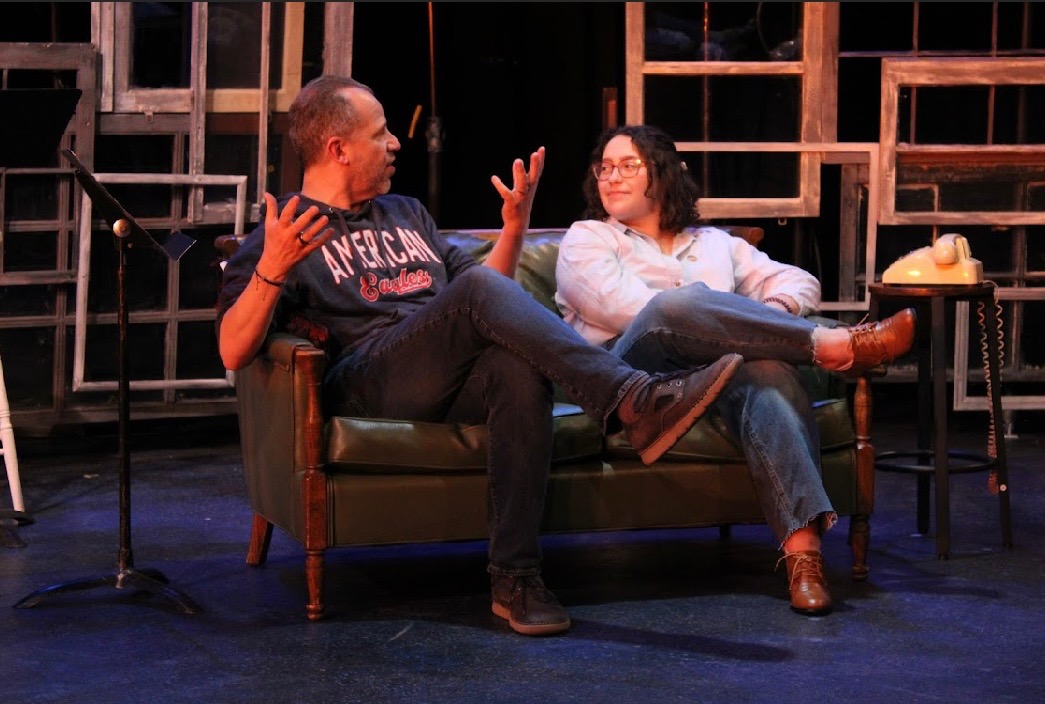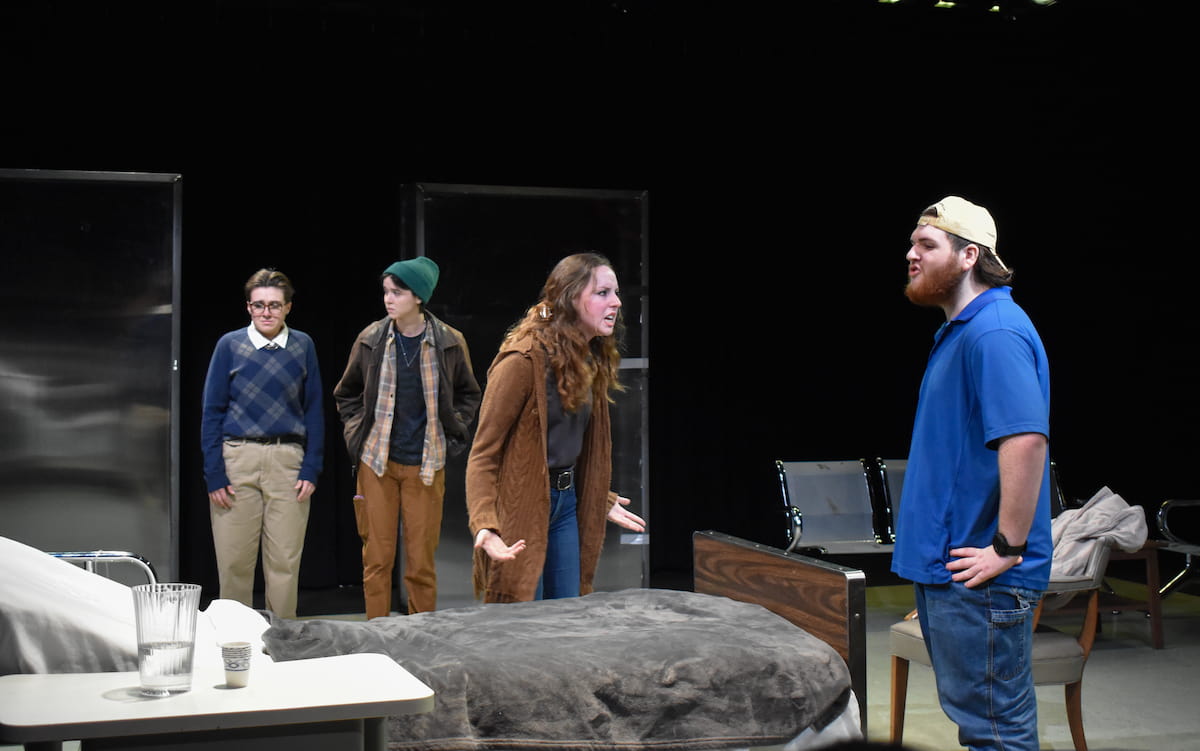"Damn Things Will Kill Ya," a Play Written and Produced at AU
 Photo: Noah Puzzo.
Photo: Noah Puzzo.
This week, American University’s Department of Performing Arts will bring AU alumna Olivia Luzquinos’s Damn Things Will Kill Ya to life in its first stage production. After Luzquinos wrote Damn Things for an AU playwriting class, it was commissioned for a reading at Signature Theater in Arlington, Virginia, in spring 2022. Now, it’s coming to life on stage at Katzen’s Studio Theatre. Directed by Professor Aaron Posner and starring Professor Tara Giordano, this production will be the first time the AU Theatre Program has fully produced a show by a recent graduate.
Damn Things Will Kill Ya centers around family matriarch Ruth, played by Giordano. Lung cancer doesn’t stop Ruth from smoking, even in the hospital. As her children gather by her bedside, they struggle with the hard-headed, hard-hearted woman who raised them — and with each other. As events unfold, the family is forced to grapple with faith, fear, forgiveness, and the complicated consequences of letting go.
See Damn Things Will Kill Ya at the Katzen Studio Theatre, December 5-9. Tickets are $10-$15 and free for AU students. Get your tickets online.
 Aaron Posner, director and Olivia Luzquinos. Photo: Jillian Skara
Aaron Posner, director and Olivia Luzquinos. Photo: Jillian Skara
Professor Tara Giordano interviewed Olivia Luzquinos about the creation of the play, the process of watching it evolve, and her journey as a playwright.
This interview has been edited for length and clarity by Amanda Bogacz.
TG: Can you tell us about your journey as a playwright?
OL: I’ve been a writer my whole life, even when I was a kid. I remember making up this stupid story about how my dogs were secret ninjas, and I called it The Karate Adventures of Zeke and Lobo, and it was about all their adventures when we weren’t home. And there was a sequel, it was nuts. I’ve always gravitated towards writing. Any time I’ve had assignments in class, whether it was poetry, fiction, or nonfiction, those were my favorite things to do.
Writing has always been a way for me to express myself. When 2016 hit, it was the first time I was grown enough to be aware of politics, and I almost didn’t go into theater. I was thinking maybe I should go into journalism or political science. But I was working on a production of The Laramie Project at the time, and one of the members of the theater company came in to talk to us. She was the first queer and out adult I had ever met. She told us she regularly did pants roles—where an actress appears in men’s clothing—and political theater, and that was how she was an activist with her art.
That moment changed my life. I realized I didn’t have to choose between being an artist and being an activist. I can do both. So, in a lot of my work, I set out to write authentic, queer representation because I don’t see a lot of accurate queer representation. I see a lot of bad queer representation in film and in theater. I just think that if there is a story that you want to see, you can’t just wait for somebody else to write it. You have to do it yourself. So that’s what I’m trying to do.
TG: When did you start developing Damn Things Will Kill Ya?
OL: I started developing it in late 2020. I saw a Zoom production of a play called A Brief History of the Lighter. While I was watching it, I was confused because the title had nothing to do with the play. I thought A Brief History of the Lighter would have been a better title for a play about a man committing serial arson, or a woman dying of terminal lung cancer who is still smoking in her hospital bed. In that second, this lightbulb, electricity hit me. I have tons of ideas. Most of them aren’t good, but when one of them is, it feels like it’s “sticky” because it just won’t leave me alone. I’ll keep thinking about it and thinking about it. Even from the start, I had this image of this woman lying in a hospital bed, smoking a cigarette, and her daughter coming in and saying, “Jesus, Ma, you’re gonna blow up the whole hospital,” and snatching the cigarette out of her hand. And that’s exactly how the play starts.
I didn’t set out for it to be a play about my family, but as I started trying to figure out what I wanted to say with it, and what I wanted to explore, it just sort of came about. I had a writing professor who once said to me, “Every writer has about three or four questions they are really trying to wrestle with,” and I know that one of mine is tied to grief in some way. Grief always makes an appearance in my work. And during the pandemic, the world stopped, and I had no other choice but to sit and think about my own grief.
My grandmother had breast cancer, and she ended up taking her own life. That was something I was thinking about a lot, and it really showed up in the play. It’s hard to talk about it, and people don’t understand all of the time, so writing this has been the best way for me to talk about it. I think I write because there are things I don’t understand about the world.
I took Aaron Posner’s playwriting class in 2021, and he asked us to come up with ten ideas for plays but I said, “I’ve already got one! This is what I want to work on.”

TG: What has been most surprising for you throughout this rehearsal process?
OL: The craziest thing that I’m still trying to wrap my head around is that people care about the things that I have to say. Especially because this play is so personal and so enmeshed in my own struggle with grief, I didn’t really think about how it would affect other people. Even when we had the reading at Signature Theater, so many people told me that they know someone who went through the same thing, or that it reminded them of their own family members. When people say, “This hits home,” it’s the best feeling because it makes me feel like I’m not alone. And, if I can touch even one person’s life or say something that might help them on their journey, that is the greatest thing that I could do.
TG: It’s such a privilege to have you in the room with us in rehearsals. To hear you share personal stories that connect to the play. And also to have you making adjustments to the script as we go. I’m always impressed by how flexible you are with your writing. How has it been for you to adapt things on the fly?
OL: I try not to be precious about it. Of course, there are some moments that I won’t budge on, but there are very few. I’m really lucky that I have such a smart group of people to work with — all the actors, the design team. And so kind. I know that everything is in service of the work. Theater isn’t made in a vacuum. To be able to collaborate with people I really admire and who reciprocate that respect has been so wonderful.
TG: What advice would you give to students who want to be playwrights?
OL: Write! Being a writer is a self-proclaimed title. No one comes in and bestows a magic crown on you and says, “You are a writer now!” If you want to write something, you should just write it. I know that sometimes it’s intimidating, but don’t let the fear of bad art stop you from making art at all.
Damn Things Will Kill Ya at the Katzen Arts Center Studio Theatre, December 5-9. Tickets are free for AU students, $10 for AU alumni, children (under 18), and seniors, and $15 for the general public. Get your tickets online.
